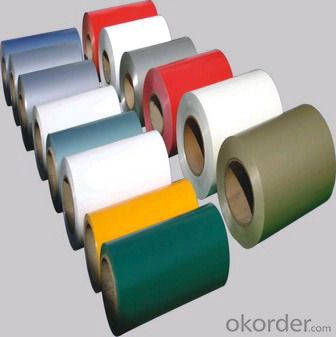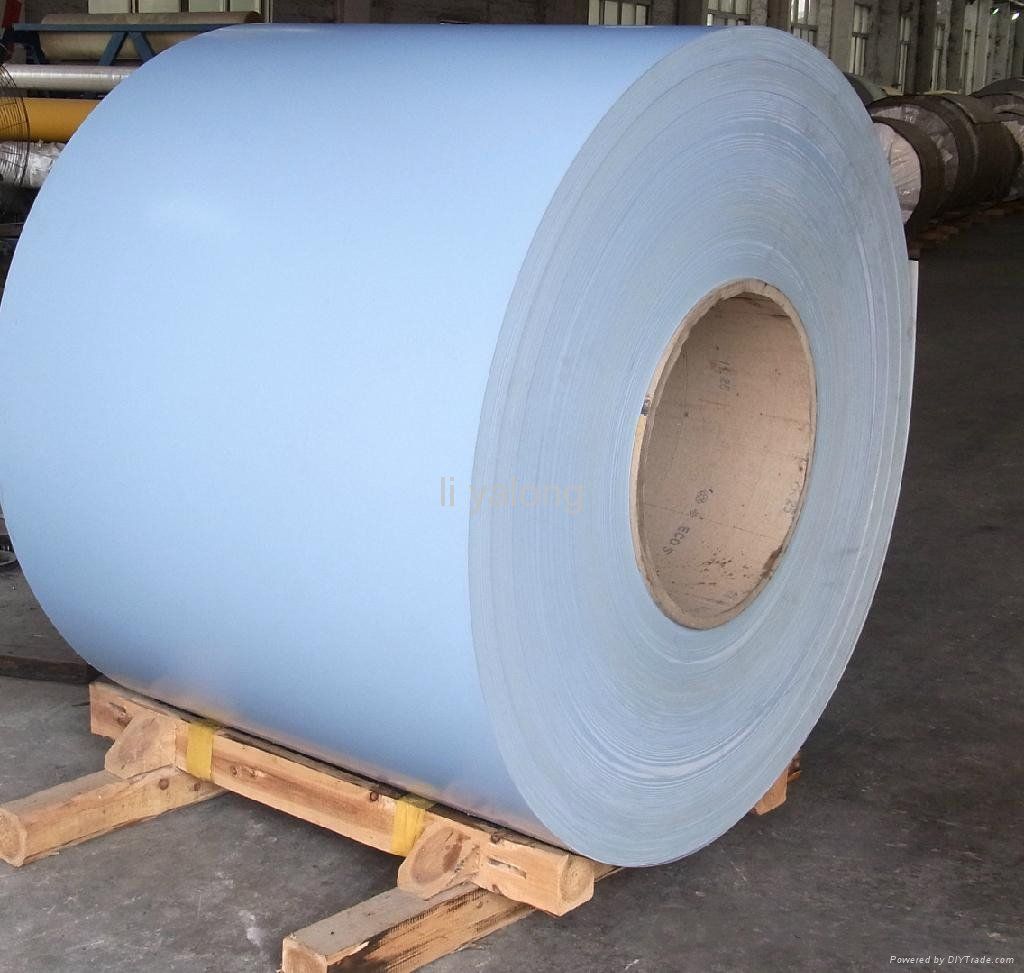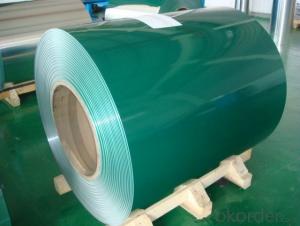RAL 5021 PVDF 25 Micros Coated Aluminium Coil
- Loading Port:
- Qingdao
- Payment Terms:
- TT OR LC
- Min Order Qty:
- 2 m.t.
- Supply Capability:
- 50000 m.t./month
OKorder Service Pledge
OKorder Financial Service
You Might Also Like
Item specifice
Description
Alloy | 1050, 1060,1100, 3003 3004 3105 3A21 5005 5052 etc |
Temper | O/H12/H14/H1/H18/H32/H34/H36/H38//H111/H112/H116/H321/T6/T651/T3/T351 etc |
Thickness | 0.1mm to 6mm |
Width | 20mm to 3300mm |
Coil weight | 100kgs to 6 tons depends on actual requirement |
Core material | Aluminum or paper |
Coil inner diameter | 75mm, 150mm, 200mm, 300mm, 405mm, 505mm or as required |
Appplication | construction, roofing, decoration, lamping etc |
Package | eye to wall or eye to the wall for aluminum coil with wood pallet (wooded case also available) |


PE and PVDF Painting
Polyester Coatings (PE)
PE (polyester) coatings exhibit an excellent combination of hardness, flexibility, flow, appearance, and superior resistance to dirt retention in indoor and outdoor applications. These coatings are highly resistant to abrasion, metal marking, staining, and marring, and require minimal maintenance. Glazetech uses polyester paints which provide excellent colour and gloss retention properties.
Polyvinylidene Fluoride Coatings (PVDF)
PVDF (polyvinylidene fluoride) is a chemical resistant thick film barrier coating commonly used in architectural applications where both excellent appearance and substrate protection must be maintained over a long period of time. This coating is unaffected by most chemicals and solvents and has excellent wear and abrasion resistance. PVDF also has a high dielectric strength, excellent resistance to weathering and the ability to self extinguish.
Application
Widely used in manufacturing of products as well as other industrial applications like:
Products Materials: PP cap stock, the traffic sign, air-conditioner heat and exchangers, food container, household foil, pharmaceutical packing, cigarettes packing etc.
Building Materials: aluminum curtain wall base plate, ACP, aluminum, ceilings, aluminum sheets, honeycomb panels and aluminum roofing, lighting decoration, household electrical appliances, food package (such as pop can cover & ring-pull), furniture ect.
FAQ
--Q: Do you provide free samples?
--A: Yes, free samples will be sent to you on freight at destination.
--Q: Can I get your latest products catalogue?
--A: Yes, it will be sent to you in no time.
--Q: What is the MOQ?
--A: 2 tons
--Q: What are your payment terms?
--A: We accept L/C, T/T.
--Q: What kinds of alloy can you supply?
--A: 1000 series: 1050, 1060, 1070, 1100, 1145, 1200
3000 series: 3003, 3004, 3105, 3104
5000 series: 5052, 5083, 5754, 5182
6000 series: 6061, 6063, 6062, 6063
8000 series: 8011, 8021
--Q: What kinds of temper can you supply?
--A: O-H112: O,H12,H14,H16,H18,H22,H24,H26,H,32,H34,H111,H112
T3, T4, T6
- Q:Can aluminum coils be used in low-friction applications?
- Yes, aluminum coils can be used in low-friction applications. Aluminum is a lightweight and corrosion-resistant material that has excellent thermal conductivity. These properties make it suitable for various applications where low-friction is desired. In industries such as automotive, aerospace, and HVAC systems, aluminum coils are often used in heat exchangers, evaporators, condensers, and cooling coils. These coils are designed to efficiently transfer heat, while minimizing friction and energy loss. Additionally, aluminum coils can be used in electrical motors, generators, and transformers, where low friction is essential for smooth operation and reduced energy consumption. The lightweight nature of aluminum also helps to reduce the overall weight of the system, leading to improved efficiency. Furthermore, aluminum coils can be utilized in various types of machinery and equipment that require low friction, such as conveyor systems, sliding mechanisms, and bearings. Aluminum's low coefficient of friction allows for smooth and efficient movement, minimizing wear and tear on the components. Overall, aluminum coils are a versatile solution for low-friction applications due to their lightweight, corrosion-resistant, and thermally conductive properties. Their use can lead to improved energy efficiency, reduced maintenance costs, and enhanced performance in a wide range of industries.
- Q:Can aluminum coils be used for structural purposes?
- Yes, aluminum coils can be used for structural purposes. Aluminum is a lightweight and versatile material that offers excellent strength-to-weight ratio. It is commonly used in various structural applications, including the construction of buildings, bridges, and aircraft. Aluminum coils can be formed and shaped into different profiles to provide support and stability in structural systems. Additionally, aluminum is highly corrosion-resistant, which makes it suitable for outdoor and marine environments. However, it is important to consider the specific requirements and load capacities of the structural project to determine if aluminum coils are suitable for the intended purpose.
- Q:Can the color coated aluminum roll be bent easily and won't break?
- As an ornamental material, it has the incomparable advantages of the following products. It can be guaranteed to be durable at least for 30 years after being treated with special surface. It is durable and has super weatherability. Fluorocarbon coating aluminum coil is made of fluorine enyne fluorocarbon resin as basic monomer, acid and alkali corrosion resistance, friction resistance and its decay, compared with plastic coating, molecular structure, sun room, bright and smooth: product classification, UV absorbers can be divided according to the gloss matte and high gloss series.
- Q:What are the typical mechanical properties of aluminum coils?
- The mechanical properties of aluminum coils can vary depending on the specific alloy and temper of the material. However, some typical mechanical properties of aluminum coils include: 1. Tensile strength: Aluminum coils generally have a high tensile strength, which refers to the maximum amount of tensile stress a material can withstand before it breaks. This property is important for applications that require the material to withstand heavy loads or stress. 2. Yield strength: Yield strength is the amount of stress a material can withstand without permanently deforming. Aluminum coils typically have a relatively high yield strength, allowing them to maintain their shape and structural integrity under normal operating conditions. 3. Elongation: Elongation refers to the amount a material can stretch or deform before it fractures. Aluminum coils typically have a relatively high elongation, making them suitable for applications that require the material to be formed or bent without breaking. 4. Hardness: The hardness of aluminum coils can vary depending on the alloy and temper. Aluminum alloys can be heat-treated to increase their hardness, making them more suitable for applications that require wear resistance or need to withstand harsh environments. 5. Fatigue strength: Fatigue strength is the ability of a material to resist the formation and growth of cracks under cyclic loading conditions. Aluminum coils generally exhibit good fatigue strength, making them suitable for applications subjected to repeated or fluctuating loads. It is important to note that these properties can vary depending on the specific alloy, temper, and processing conditions of the aluminum coils. Therefore, it is recommended to consult the material specifications or contact the manufacturer for more accurate and detailed information on the mechanical properties of specific aluminum coils.
- Q:I need help with 3 main ideas for a aluminum and copper chloride lab. I need evidence for these 3 ideas that what happened was a chemical reaction.
- Change in mass, change in color, change in temp, change in ...
- Q:What are the common applications of aluminum coils?
- Due to their unique properties and versatility, aluminum coils are extensively used in various industries. They have numerous applications, some of which are highlighted below: 1. HVAC Systems: Aluminum coils play a crucial role in heat transfer in air conditioning and refrigeration systems. Their lightweight nature and excellent thermal conductivity make them an ideal choice for these purposes. 2. Transportation Industry: The automotive and aerospace industries commonly employ aluminum coils in the manufacturing of radiators, condensers, evaporators, and other heat exchange components. Aluminum's high strength-to-weight ratio helps in reducing the overall vehicle weight, resulting in improved fuel efficiency. 3. Construction Sector: The construction industry widely utilizes aluminum coils in the production of gutters, downspouts, roofing, and cladding materials. Aluminum's corrosion resistance and durability make it the preferred choice for outdoor applications that require long-lasting performance. 4. Electrical Industry: Aluminum coils are excellent for the production of cables, wires, transformers, and power distribution systems due to their exceptional electrical conductivity. 5. Packaging Industry: Aluminum coils are extensively used in producing various packaging materials, including cans, foils, and containers. Aluminum's ability to create a barrier against moisture, light, and oxygen makes it ideal for preserving the freshness and quality of food and beverages. 6. Marine Applications: The marine industry relies on aluminum coils for the manufacturing of boats, ships, and other offshore structures. Aluminum's resistance to corrosion in saltwater environments makes it suitable for these applications. 7. Industrial Equipment: Aluminum coils are utilized in various industrial equipment, such as heat exchangers, condensers, and evaporators. Their thermal conductivity and corrosion resistance properties enable efficient heat transfer. In conclusion, aluminum coils find widespread use in several industries, including HVAC, transportation, construction, electrical, packaging, marine, and industrial equipment. Their lightweight nature, excellent thermal conductivity, corrosion resistance, and durability make them highly desirable for a variety of applications.
- Q:Can aluminum coils be used in solar panel manufacturing?
- Solar panel manufacturing can incorporate aluminum coils as they are lightweight and durable. This material is widely utilized across industries, including the solar panel manufacturing sector, due to its exceptional thermal conductivity, resistance to corrosion, and cost-effectiveness. In the production of solar panels, aluminum coils are commonly employed to construct the frame or support structure for the photovoltaic cells. By fabricating and shaping the coils to the desired configuration, a robust and steady structure is achieved for the solar panel. Furthermore, aluminum is recyclable, making it an environmentally conscious option for the production of solar panels.
- Q:How are aluminum coils protected against UV degradation?
- Aluminum coils are commonly protected against UV degradation through the application of protective coatings or treatments. These coatings act as a barrier between the aluminum surface and the harmful ultraviolet (UV) rays from the sun, preventing them from causing damage or degradation to the metal. One common method of protection is the application of organic coatings, such as polyvinylidene fluoride (PVDF) or polyester coatings. These coatings are specifically formulated to provide excellent resistance against UV radiation. They form a durable and protective layer on the surface of the aluminum coil, shielding it from the harmful effects of prolonged sun exposure. Another method is anodizing, which involves an electrochemical process that creates a protective oxide layer on the aluminum surface. This oxide layer acts as a barrier against UV rays and prevents them from reaching the underlying metal. Anodized aluminum coils are known for their excellent resistance to UV degradation and are commonly used in outdoor applications where long-term durability is required. In addition to these protective coatings and treatments, aluminum coils can also be designed with specific alloy compositions that enhance their resistance to UV degradation. Certain alloy elements, such as magnesium and manganese, can improve the natural ability of aluminum to withstand UV radiation. These alloy additions increase the overall durability and UV resistance of the aluminum coil, minimizing the potential for degradation over time. Overall, the protection of aluminum coils against UV degradation is a critical consideration in applications where the coils are exposed to sunlight. By utilizing protective coatings, anodizing, or selecting appropriate alloy compositions, manufacturers can effectively safeguard the aluminum coils and ensure their long-term performance and durability even in challenging outdoor environments.
- Q:Can aluminum coils be used in water treatment plants?
- Aluminum coils have a wide range of applications in water treatment plants due to their corrosion resistance and efficiency in heat transfer. They are commonly used in heat exchangers and condensers for optimal heat transfer. In water treatment plants, aluminum coils serve various purposes. For instance, they are utilized in cooling towers to effectively remove heat from water by circulating it over the coils. This process facilitates the transfer of heat from the water to the surrounding air, resulting in the cooling of the water. Moreover, aluminum coils are also employed in the construction of evaporators, which aid in the evaporation of water during the treatment process. These coils are designed to have a large surface area, maximizing contact between the water and the aluminum surface to enhance evaporation efficiency. Additionally, aluminum coils play a crucial role in air handling units (AHUs) within water treatment plants. AHUs help regulate temperature, humidity, and air quality in the facility. The aluminum coils in AHUs contribute to the overall efficiency of the system by cooling or heating the air passing through them. However, it is important to consider the compatibility of aluminum with the specific water being treated. Certain water compositions, such as those with low pH or high levels of certain chemicals, can cause corrosion or chemical reactions that may affect the performance and durability of aluminum coils. Therefore, it is essential to assess the water composition and seek guidance from experts or manufacturers to ensure the suitability of aluminum coils for a particular water treatment application.
- Q:Can aluminum coils be used for automotive heat shields?
- Yes, aluminum coils can be used for automotive heat shields. Aluminum is a lightweight and durable material that has excellent heat resistance properties, making it suitable for use in automotive heat shields. Its ability to dissipate heat efficiently helps protect sensitive components from excessive heat, ensuring optimal performance and durability in vehicles.
1. Manufacturer Overview |
|
|---|---|
| Location | |
| Year Established | |
| Annual Output Value | |
| Main Markets | |
| Company Certifications | |
2. Manufacturer Certificates |
|
|---|---|
| a) Certification Name | |
| Range | |
| Reference | |
| Validity Period | |
3. Manufacturer Capability |
|
|---|---|
| a)Trade Capacity | |
| Nearest Port | |
| Export Percentage | |
| No.of Employees in Trade Department | |
| Language Spoken: | |
| b)Factory Information | |
| Factory Size: | |
| No. of Production Lines | |
| Contract Manufacturing | |
| Product Price Range | |
Send your message to us
RAL 5021 PVDF 25 Micros Coated Aluminium Coil
- Loading Port:
- Qingdao
- Payment Terms:
- TT OR LC
- Min Order Qty:
- 2 m.t.
- Supply Capability:
- 50000 m.t./month
OKorder Service Pledge
OKorder Financial Service
Similar products
New products
Hot products
Related keywords




























